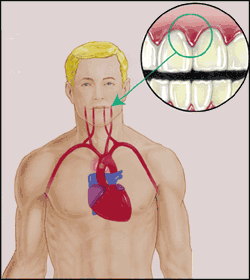
Diabetes and Gum Disease
It is well known that people with diabetes are more prone to bacterial infections than people without diabetes. As gum disease is actually a bacterial infection, diabetics have higher prevalence of periodontal diseases. Recent studies have shown that the link between diabetes and gum disease is even stronger, suggesting a two-way connection between the two conditions.
The relationship between diabetes and gum disease
According to the American Academy of Periodontology the rate of periodontal disease among diabetics is double than in the non-diabetic population. Periodontal disease in the normal population is rare before the age of 20, while 30% of 20yrs old diabetics have gum disease. Gum problems on healthy population appear after the age of 30yrs increasing to 60% in the 45-54 age group. Among patients with diabetes, the rates of gum disease are much higher reaching 50% by age 35 and 80%+ in the 45-54 group.
While the impact of diabetes on gum disease is widely documented, it was not until recently that research suggested that there is also an impact on diabetic blood sugar levels by periodontitis. The results of these studies show that advanced gum disease (periodontitis) may be an important risk factor in the progression of diabetes.
How diabetes may cause or worsen gum disease?
The relationship between diabetes and gum disease is well documented, and several ways that diabetes impacts gum’s health are described:
- Increased infection risk. Diabetes is known to have a negative impact on the body’s immune system. The reduced efficiency of white blood cells to fight infections increases the risk of developing gum disease which is a bacterial infection of the soft and hard tissues of the mouth.
- Impaired healing. One of the main characteristics of diabetes is that the body has reduced healing ability. Any wound is much more difficult to heal in diabetics. Damage caused to soft tissues by gum disease is much more severe in patients with diabetes due to the impaired healing ability. When a healthy patient might experience a mild gingivitis, under the same conditions the diabetic patient may suffer from severe periodontitis.
- Increased sugar levels. Many of the bacteria that cause periodontal disease use sugar as their main nutrient. Poor diabetic control and increased sugar levels in the blood can actually enhance the growth of the bacteria that cause oral infections.
- Structural cell damage. Poorly controlled insulin-dependent diabetics have destructive changes in the blood vessels and the cells of supporting tissues such as the gums, making patients more susceptible to gum problems.
How gum disease can impact diabetes?
Several studies have shown that the presence of periodontitis may promote the development of diabetes and related complications.
Acute bacterial infections, such as advanced gum disease, may alter the metabolism of the patient which makes it more difficult to regulate the blood sugar levels and control diabetes. Other studies indicate that periodontal bacteria can actually increase the blood sugar, which could make patients with periodontal disease more susceptible to the development of diabetes. In one recent study, diabetic patients required less frequent insulin intake following treatment for their gum disease.
By preventing or treating gum disease, reducing the infection of gum tissues, it is possible to better control the blood sugar levels when excessive blood sugar had been present. Decreasing the amount of time the body functions with high blood sugar, can reduce the risk of diabetes complications.
Advanced gum disease is the main cause of tooth loss over the age of 50. Patients with diabetes who have to wear dentures have more problems to achieve and maintain proper denture support. Their diet and nutrition are usually compromised with an undesirable increased intake of refined carbohydrates, negatively affecting their existing diabetes problem.
How to improve control of diabetes and gum disease?
If you are diabetic, it is important to monitor and control not only your diabetes but also the health of your gums. Maintaining good oral health with proper daily oral hygiene will help you avoid gum disease and prevent diabetes complications that could be triggered by the bacterial infection.
Keeping blood sugar levels under control with proper diet and exercise, can help in decreasing the risk of developing severe periodontal disease.
Patients with diabetes are a high risk group for gum disease and must undergo regular periodontal evaluations to detect and treat gum disease at an earlier stage as possible. In the early stages of periodontal diseases, treatment for diabetic patients is no different than in regular patients, usually involving scaling and root planing. In more advanced cases where additional surgical treatment for pocket depth reduction is necessary, treatment in patients with diabetes has to be combined with antibiotics to better control the bacterial infection and its effects to diabetes status.
Gum disease and diabetes have a strong 2-way relationship promoting each other. Preventing gum disease and keeping diabetes under control is the only way to avoid further health problems.

